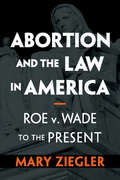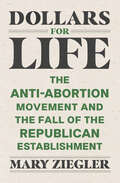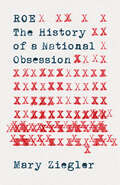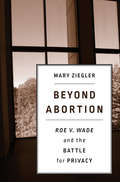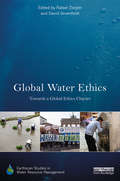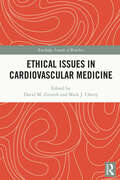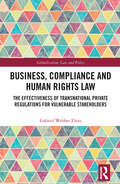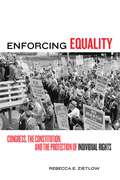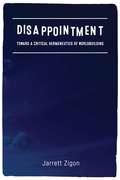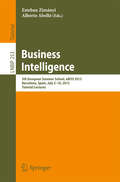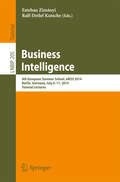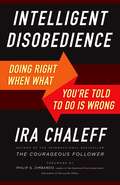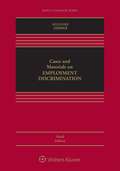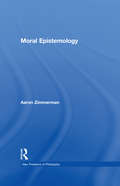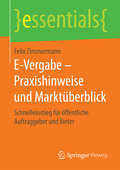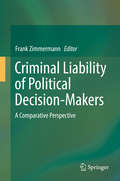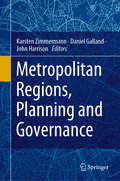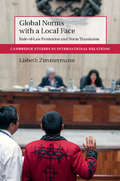- Table View
- List View
Abortion and the Law in America: Roe v. Wade to the Present
by Mary ZieglerWith the Supreme Court likely to reverse Roe v. Wade, the landmark abortion decision, American debate appears fixated on clashing rights. The first comprehensive legal history of a vital period, Abortion and the Law in America illuminates an entirely different and unexpected shift in the terms of debate. Rather than simply championing rights, those on opposing sides battled about the policy costs and benefits of abortion and laws restricting it. This mostly unknown turn deepened polarization in ways many have missed. Never abandoning their constitutional demands, pro-choice and pro-life advocates increasingly disagreed about the basic facts. Drawing on unexplored records and interviews with key participants, Ziegler complicates the view that the Supreme Court is responsible for the escalation of the conflict. A gripping account of social-movement divides and crucial legal strategies, this book delivers a definitive recent history of an issue that transforms American law and politics to this day.
Dollars for Life: The Anti-Abortion Movement and the Fall of the Republican Establishment
by Mary ZieglerA new understanding of the slow drift to extremes in American politics that shows how the antiabortion movement remade the Republican Party &“A timely and expert guide to one of today&’s most hot-button political issues.&”—Publishers Weekly (starred review) &“A sober, knowledgeable scholarly analysis of a timely issue.&”—Kirkus Reviews &“[Ziegler&’s] argument in [is] that, over the course of decades, the anti-abortion movement laid the groundwork for an insurgent candidate like Trump.&”—Jennifer Szalai, New York Times The modern Republican Party is the party of conservative Christianity and big business—two things so closely identified with the contemporary GOP that we hardly notice the strangeness of the pairing. Legal historian Mary Ziegler traces how the anti-abortion movement helped to forge and later upend this alliance. Beginning with the Supreme Court&’s landmark decision in Buckley v. Valeo, right‑to‑lifers fought to gain power in the GOP by changing how campaign spending—and the First Amendment—work. The anti-abortion movement helped to revolutionize the rules of money in U.S. politics and persuaded conservative voters to fixate on the federal courts. Ultimately, the campaign finance landscape that abortion foes created fueled the GOP&’s embrace of populism and the rise of Donald Trump. Ziegler offers a surprising new view of the slow drift to extremes in American politics—and explains how it had everything to do with the strange intersection of right-to-life politics and campaign spending.
Roe: The History of a National Obsession
by Mary ZieglerThe leading U.S. expert on abortion law charts the many meanings associated with Roe v. Wade during its fifty-year history “Ziegler sets a brisk pace but delivers substantial depth. . . . A must-read for those seeking to understand what comes next.”—Publishers Weekly What explains the insistent pull of Roe v. Wade? Abortion law expert Mary Ziegler argues that the U.S. Supreme Court decision, which decriminalized abortion in 1973 and was overturned in 2022, had a hold on us that was not simply the result of polarized abortion politics. Rather, Roe took on meanings far beyond its original purpose of protecting the privacy of the doctor-patient relationship. It forced us to confront questions about sexual violence, judicial activism and restraint, racial justice, religious liberty, the role of science in politics, and much more. In this history of what the Supreme Court’s best-known decision has meant, Ziegler identifies the inconsistencies and unsettled issues in our abortion politics. She urges us to rediscover the nuance that has long resided where we would least expect to find it—in the meaning of Roe itself.
Beyond Abortion: <i>Roe v. Wade</i> and the Battle for Privacy
by Mary Ziegler ZieglerFor most Americans today, Roe v. Wade concerns just one thing: the right to choose abortion. But the Supreme Court’s decision once meant much more. The justices ruled that the right to privacy encompassed the abortion decision. Grassroots activists and politicians used Roe—and popular interpretations of it—as raw material in answering much larger questions: Is there a right to privacy? For whom, and what is protected? As Mary Ziegler demonstrates, Roe’s privacy rationale attracted a wide range of citizens demanding social changes unrelated to abortion. Movements questioning hierarchies based on sexual orientation, profession, class, gender, race, and disability drew on Roe to argue for an autonomy that would give a voice to the vulnerable. So did advocates seeking expanded patient rights and liberalized euthanasia laws. Right-leaning groups also invoked Roe’s right to choose, but with a different agenda: to attack government involvement in consumer protection, social welfare, racial justice, and other aspects of American life. In the 1980s, seeking to unify a fragile coalition, the Republican Party popularized the idea that Roe was a symbol of judicial tyranny, discouraging anyone from relying on the decision to frame their demands. But Beyond Abortion illuminates the untapped potential of arguments that still resonate today. By recovering the diversity of responses to Roe, and the legal and cultural battles it energized, Ziegler challenges readers to come to terms with the uncomfortable fact that privacy belongs to no party or cause.
Global Water Ethics: Towards a global ethics charter (Earthscan Studies in Water Resource Management)
by Rafael Ziegler David GroenfeldtScholarly interest in water ethics is increasing, motivated by the urgency of climate change, water scarcity, privatization and conflicts over water resources. Water ethics can provide both conceptual perspectives and practical methodologies for identifying outcomes which are environmentally sustainable and socially just. This book assesses the implications of ongoing research in framing a new discipline of water ethics in practice. Contributions consider the difficult ethical and epistemological questions of water ethics in a global context, as well as offering local, empirical perspectives. Case study chapters focus on a range of countries including Canada, China, Germany, India, South Africa and the USA. The respective insights are brought together in the final section concerning the practical project of a universal water ethics charter, alongside theoretical questions about the legitimacy of a global water ethics. Overall the book provides a stimulating examination of water ethics in theory and practice, relevant to academics and professionals in the fields of water resource management and governance, environmental ethics, geography, law and political science.
Voting Rights of Refugees
by Ruvi ZieglerVoting Rights of Refugees develops a novel legal argument about the voting rights of refugees recognised in the 1951 Geneva Convention. The main normative contention is that such refugees should have the right to vote in the political community where they reside, assuming that this community is a democracy and that its citizens have the right to vote. The book argues that recognised refugees are a special category of non-citizen residents: they are unable to participate in elections of their state of origin, do not enjoy its diplomatic protection and consular assistance abroad, and are unable or unwilling, owing to a well-founded fear of persecution, to return to it. Refugees deserve to have a place in the world, in the Arendtian sense, where their opinions are significant and their actions are effective. Their state of asylum is the only community in which there is any prospect of political participation on their part.
Ethical Issues in Cardiovascular Medicine (Routledge Annals of Bioethics)
by David M. Zientek Mark J. CherryThis book provides an exploration of the ethics of cardiology practice. It provides a variety of frameworks for analyzing ethical issues that arise in cardiovascular medicine. Cardiovascular medicine—the diagnosis and treatment of congenital and acquired diseases of the heart, major arteries, and veins—has seen rapid change in diagnosis, treatment, and the organization of practice in the last half of the twentieth and the beginning of the twenty first century. The complexity of these developments has resulted in increasing subspecialization, and many practitioners are challenged to stay abreast with the latest developments in cardiology. These changes also bring with them various ethical challenges. The chapters in this volume are divided by five broad areas of practice: beginning-of-life, end-of-life, transplantation and allocation of expensive or scarce resources, professionalism, and research. The case-based approach presented across the volume provides a perspective that will allow readers to reason through current and future ethical issues as they arise in this rapidly changing field. Ethical Issues in Cardiovascular Medicine will be of interest to researchers working in bioethics, clinical ethics, and the philosophy of medicine, as well as practicing physicians, nurses, and students who work in cardiovascular medicine.
Investitionsschutz für Maschinendaten: Eine Untersuchung des Schutzes maschinengenerierter Daten der Industrie 4.0 durch das Datenbankherstellerrecht
by Angelina ZierDie intelligente Produktion in der Industrie 4.0 erfordert einen stetigen Austausch sowie die Verarbeitung riesiger Mengen maschinengenerierter Daten. Deshalb sind diese Daten zu einem zentralen Produktionsmittel und Wirtschaftsgut mit erheblichem Wert geworden. Aus diesem Grund haben die datenhaltenden Unternehmen ein großes Interesse daran, ihre Daten für sich selbst gewinnbringend zu nutzen. Demgegenüber besteht wegen der immer größeren Bedeutung der Maschinendaten auch ein erhebliches Interesse am Zugang zu den Daten anderer Unternehmen. Deshalb ist ein Rechtsrahmen für maschinengenerierte Daten erforderlich, der einen hinreichenden Schutz gewährt, aber auch ausreichende Datenzugangsmöglichkeiten etabliert. Ein geeignetes Datenmanagement in der Industrie 4.0 erfordert regelmäßig die Einrichtung von Datenbanken zur Speicherung und Verarbeitung der maschinengenerierten Daten. Deshalb liegt die Anwendung des Datenbankherstellerrechts nahe, um einen rechtlichen Schutz der Daten zu ermöglichen. Die Autorin untersucht, ob das Datenbankherstellerrecht auf Industrie 4.0-Datenbanken Anwendung finden kann und welche Probleme sich dabei ergeben. Es werden Vorschläge für eine Adaption des Datenbankherstellerrechts gemacht.
Business, Compliance and Human Rights Law: The Effectiveness of Transnational Private Regulations for Vulnerable Stakeholders (Globalization: Law and Policy)
by Gabriel Webber ZieroIn recent years, sustainability-related certifications and labels, which are based on Transnational Private Regulations (TPRs), have gained in importance in the areas of business and human rights, particularly from a consumer point of view. However, some question whether companies adhering and complying with TPRs’ normative frameworks are able to effectively meet the expectations deriving from international human rights standards. In response to this question, this book proposes an analytical concept of effective compliance. Based on the elements identified as crucial for achieving effective compliance, it conducts an in-depth analysis of how TPRs’ normative frameworks function in practice and identifies common patterns and challenges. Such inquiry is based on an interdisciplinary methodological approach between law and sociology, seeking not only to comprehend and assess how law is systematised in theoretical terms, but also to understand how it works on the ground. This allows identification of the lack of active and effective participation of vulnerable stakeholders in the discursive processes established and governed by TPRs, such as rule-making and conformity assessment processes, as the main challenge. Based on such evidence, the book addresses the possibilities of overcoming such challenges, proposing that to fully achieve TPRs’ potential from an effective compliance point of view, legal empowerment of vulnerable groups is essential. It concludes by providing key observations and suggestions that contribute to the use of TPRs as instruments in the struggle for rights of empowered vulnerable stakeholders. The book will be of interest to academics, researchers and policy-makers working in the areas of international law, transnational law, sociology of law and human rights law.
Enforcing Equality: Congress, the Constitution, and the Protection of Individual Rights
by Rebecca E ZietlowIn Enforcing Equality, Rebecca E. Zietlow assesses Congress's historical role in interpreting the Constitution and protecting the individual rights of citizens, provocatively challenging conventional wisdom that courts, not legislatures, are best suited for this role.Specifically focusing on what she calls "rights of belonging"--a set of positive entitlements that are necessary to ensure inclusion, participation, and equal membership in diverse communities--Zietlow examines three historical eras: Reconstruction, the New Deal era, and Civil Rights era of the 1960s. She reveals that in these key periods when rights of belonging were contested and defined, Congress has played the role of protector of rights at least as often as the Supreme Court has adopted this role. Enforcing Equality also engages in a sophisticated theoretical analysis of Congress as a protector of rights, comparing the institutional strengths and weaknesses of Congress and the courts as protectors of the rights of belonging.With the recent new appointments to the Supreme Court and Congressional elections in November 2006, this timely book argues that individual rights are best enforced by the political process because they express the values of our national community, and as such, litigation is no substitute for collective political action.
Disappointment: Toward a Critical Hermeneutics of Worldbuilding
by Jarrett ZigonIncreasingly, anthropologists, political theorists and philosophers are calling for imaginative and creative analyses and theories that might help us think and bring about an otherwise. Disappointment responds to this call by showing how collaboration between an anthropologist and a political movement of marginalized peoples can disclose new possibilities for being and acting politically. Drawing from nearly a decade of research with the global anti-drug war movement, Jarrett Zigon puts ethnography in dialogue with both political theory and continental philosophy to rethink some of the most fundamental ontological, political and ethical concepts. The result is to show that ontological starting points have real political implications, and thus, how an alternative ontological starting point can lead to new possibilities for building worlds more ethically attuned to their inhabitants.
Medical Research Ethics: Challenges in the 21st Century (Philosophy and Medicine #132)
by Tomas Zima David N. WeisstubThis book provides a current review of Medical Research Ethics on a global basis. The book contains chapters that are historically and philosophically reflective and aimed to promote a discussion about controversial and foundational aspects in the field. An elaborate group of chapters concentrates on key areas of medical research where there are core ethical issues that arise both in theory and practice: genetics, neuroscience, surgery, palliative care, diagnostics, risk and prediction, security, pandemic threats, finances, technology, and public policy.This book is suitable for use from the most basic introductory courses to the highest levels of expertise in multidisciplinary contexts. The insights and research by this group of top scholars in the field of bioethics is an indispensable read for medical students in bioethics seminars and courses as well as for philosophy of bioethics classes in departments of philosophy, nursing faculties, law schools where bioethics is linked to medical law, experts in comparative law and public health, international human rights, and is equally useful for policy planning in pharmaceutical companies.
Business Intelligence: 5th European Summer School, eBISS 2015, Barcelona, Spain, July 5-10, 2015, Tutorial Lectures (Lecture Notes in Business Information Processing #253)
by Esteban Zimányi Alberto AbellóThis book constitutes the tutorial lectures of the 5th European Business Intelligence Summer School, eBISS 2015, held in Barcelona, Spain, in July 2015. The tutorials presented here in an extended and refined format were given by renowned experts and cover topics including schema evolution for databases and data warehouses, publishing OLAP cubes on the Semantic Web, design issues in social business intelligence projects, context-aware business intelligence, and key performance indicators in data warehouses.
Business Intelligence: 4th European Summer School, eBISS 2014, Berlin, Germany, July 6-11, 2014, Tutorial Lectures (Lecture Notes in Business Information Processing #205)
by Esteban Zimányi Ralf-Detlef KutscheThis book constitutes the tutorial lectures of the 4th European Business Intelligence Summer School, eBISS 2014, held in Berlin, Germany, in July 2014. The tutorials presented here in an extended and refined format were given by renowned experts and cover topics including requirements engineering for decision-support systems, visual analytics of large data sets, linked data and semantic technologies, supervised classification on data streams, and knowledge reuse in large organizations.
Intelligent Disobedience
by Philip Zimbardo Ira ChaleffWhen It's Smart to Say NoNearly every week we read about a tragedy or scandal that could have been prevented if individuals had said no to ill-advised or illegitimate orders. In this timely book, Ira Chaleff explores when and how to disobey inappropriate orders, reduce unacceptable risk, and find better ways to achieve legitimate goals.The inspiration for the book, and its title, comes from the concept of intelligent disobedience used in guide dog training. Guide dogs must recognize and resist a command that would put their human and themselves at risk and identify safer options for achieving the goal. This is precisely what Chaleff helps humans do. Using both deeply disturbing and uplifting examples, as well as critical but largely forgotten research, he shows how to create a culture where, rather than "just following orders," people hold themselves accountable to do the right thing, always.
Surveillance Cinema (Postmillennial Pop #2)
by Catherine ZimmerIn Paris, a static video camera keeps watch on a bourgeois home. In Portland, a webcam documents the torture and murder of kidnap victims. And in clandestine intelligence offices around the world, satellite technologies relentlessly pursue the targets of global conspiracies. Such plots represent only a fraction of the surveillance narratives that have become commonplace in recent cinema. Catherine Zimmer examines how technology and ideology have come together in cinematic form to play a functional role in the politics of surveillance. Drawing on the growing field of surveillance studies and the politics of contemporary monitoring practices, she demonstrates that screen narrative has served to organize political, racial, affective, and even material formations around and through surveillance. She considers how popular culture forms are intertwined with the current political landscape in which the imagery of anxiety, suspicion, war, and torture has become part of daily life. From Enemy of the State and The Bourne Series to Saw, Caché and Zero Dark Thirty, Surveillance Cinema explores in detail the narrative tropes and stylistic practices that characterize contemporary films and television series about surveillance.
Cases And Materials On Employment Discrimination (Aspen Casebook)
by Michael J. Zimmer Charles A. SullivanThe ninth edition of the best-selling Cases and Materials on Employment Discrimination blends cases, notes, and problems into an integrated pedagogy that balances scholarly and practice perspectives. The authors build a conceptual framework for understanding how discrimination is defined and proven in litigation. The text allows professors to explore particular interests more deeply and permits them to take not only a litigation approach but also explore the compliance, investigation, and counseling perspectives that are characteristic of modern practice. The broad coverage integrates scholarship with legal doctrine drawn from statutes and judicial decisions. The useful Statutory Supplement is available for separate purchase.
Moral Epistemology (New Problems of Philosophy)
by Aaron ZimmermanHow do we know right from wrong? Do we even have moral knowledge? Moral epistemology studies these and related questions about our understanding of virtue and vice. It is one of philosophy’s perennial problems, reaching back to Plato, Aristotle, Aquinas, Locke, Hume and Kant, and has recently been the subject of intense debate as a result of findings in developmental and social psychology. In this outstanding introduction to the subject Aaron Zimmerman covers the following key topics: What is moral epistemology? What are its methods? Including a discussion of Socrates, Gettier and contemporary theories of knowledge skepticism about moral knowledge based on the anthropological record of deep and persistent moral disagreement, including contextualism moral nihilism, including debates concerning God and morality and the relation between moral knowledge and our motives and reasons to act morally epistemic moral scepticism, intuitionism and the possibility of inferring ‘ought’ from ‘is,’ discussing the views of Locke, Hume, Kant, Ross, Audi, Thomson, Harman, Sturgeon and many others how children acquire moral concepts and become more reliable judges criticisms of those who would reduce moral knowledge to value-neutral knowledge or attempt to replace moral belief with emotion. Throughout the book Zimmerman argues that our belief in moral knowledge can survive sceptical challenges. He also draws on a rich range of examples from Plato’s Meno and Dickens’ David Copperfield to Bernard Madoff and Saddam Hussein. Including chapter summaries and annotated further reading at the end of each chapter, Moral Epistemology is essential reading for all students of ethics, epistemology and moral psychology.
Protecting Your Intellectual Property Rights
by Alan Zimmerman Peggy E ChaudhryCounterfeit products represent a growing problem for a wide range of industries. There are many estimates of the size of this problem most of which coalesce around $500-billion annually on a global basis. Overall, a wide range of industries agree that there is a severe problem with the global protection of intellectual property rights (IPR), yet, there have been virtually no attempts to describe all aspects of the problem. This book aims at giving the most complete description of various characteristics of the intellectual property rights (IPR) environment in a global context. The authors believe a holistic understanding of the problem must include consumer complicity to purchase counterfeit, actions of the counterfeiters (pirates) as well as actions (or inaction) by home and host governments, and the role of international organizations and industry alliances. Only after establishing how all the actors in the IPR environment relate to one another can we describe global protection of the intellectual property rights environment and the managerial response of IPR owners and/or industry associations to combat this ongoing problem. The book concludes with pragmatic recommendations for protecting intellectual property given the recent trends discussed in the previous chapters, making it of interest to practitioners and policy-makers alike.
E-Vergabe – Praxishinweise und Marktüberblick: Schnelleinstieg für öffentliche Auftraggeber und Bieter (essentials)
by Felix ZimmermannDieses essential bietet einen schnellen Überblick über die praxisrelevanten Aspekte der bis Herbst 2018 einzuführenden elektronischen Vergabe öffentlicher Aufträge. Der Übergang vom Papier zum Digitalen eröffnet Staat und Unternehmen viele Chancen zur Effektivität des Ausschreibungsprozesses und birgt zugleich Risiken. Mit dem entsprechenden rechtlichen, technischen und organisatorischen Know-how lässt sich die E-Vergabe aber gezielt als effizientes Einkaufsinstrument einsetzen. Hierfür setzt dieses essential erste Impulse und sorgt mit einem nahezu vollständigen Marktüberblick über die verfügbaren E-Vergabe-Standardlösungen für ein praxisnahes Verständnis bei Entscheidern.
Criminal Liability of Political Decision-Makers: A Comparative Perspective
by Frank ZimmermannThis book is dedicated to a fundamental conflict in modern states: those persons holding public office are no more than ordinary citizens. Therefore, their activities must - as a matter of principle - be subject to full judicial control. But at the same time, democratically legitimated politicians need some discretion in their decision-making. Allegations of politicians committing criminal offences in office quickly attract a great deal of media attention. Even politicians themselves frequently use such allegations to discredit their political opponents. However, to date this topic has not been fully addressed on an academic level. This book is a first step in this direction. The individual contributions cover topics such as: "bad" political decisions that result in a waste of taxpayers' money corruption and conflicts of interest in political decision-making immunities and procedural obstacles to the effective prosecution of politicians abuse of criminal law and criminal proceedings in the political arena criminal liability for decisions taken in situations of state emergency the role of criminal law in public opinion. Leading experts examine these and other issues from a comparative perspective.
Regulating Capitalism?: The Evolution of Transnational Accounting Governance
by Jochen Zimmermann Jörg R. WernerThis book charts the regulatory changes at the heart of capitalist economies; the financial reporting on financial markets. It is a unique contribution interconnecting issues both of contemporary political science and accounting research. The book contains in-depth descriptions of regulatory settings (and changes) in six countries: Canada, France, Germany, Japan, the United Kingdom and the United States and aims to takes a close look at drivers of change such as crises and globalization. The book also links these drivers of change with moderating institutional structures such as the legal and financial systems, but also the welfare states in place. Taken together, it shows how a trend to more transnationalization in accounting emerges but also its likely limits.
Metropolitan Regions, Planning and Governance
by Karsten Zimmermann Daniel Galland John HarrisonThe aim of this book is to investigate contemporary processes of metropolitan change and approaches to planning and governing metropolitan regions. To do so, it focuses on four central tenets of metropolitan change in terms of planning and governance: institutional approaches, policy mobilities, spatial imaginaries, and planning styles. The book’s main contribution lies in providing readers with a new conceptual and analytical framework for researching contemporary dynamics in metropolitan regions. It will chiefly benefit researchers and students in planning, urban studies, policy and governance studies, especially those interested in metropolitan regions.The relentless pace of urban change in globalization poses fundamental questions about how to best plan and govern 21st-century metropolitan regions. The problem for metropolitan regions—especially for those with policy and decision-making responsibilities—is a growing recognition that these spaces are typically reliant on inadequate urban-economic infrastructure and fragmented planning and governance arrangements. Moreover, as the demand for more ‘appropriate’—i.e., more flexible, networked and smart—forms of planning and governance increases, new expressions of territorial cooperation and conflict are emerging around issues and agendas of (de-)growth, infrastructure expansion, and the collective provision of services.
Global Norms with a Local Face: Rule-of-Law Promotion and Norm Translation (Cambridge Studies in International Relations)
by Lisbeth ZimmermannTo what extent are global rule-of-law norms, which external actors promote in post-conflict states, localized? Who decides whether global standards or local particularities prevail? This book offers a new approach to the debate about how the dilemma between the diffusion of global norms and their localization is dealt with in global politics. Studying the promotion of children’s rights, access to public information and an international commission against impunity in Guatemala, Lisbeth Zimmermann demonstrates that rule-of-law promotion triggers domestic contestation, and thereby changes the approach taken by external actors and ultimately the manner in which global norms are translated. However, the leeway in local translation is determined by the precision of global norms. Based on an innovative theoretical approach and in-depth study of rule-of-law translation, she argues for a shift in norm promotion from context sensitivity to democratic appropriation, speaking to international relations, peacebuilding, democratization studies, international law and political theory.
Der Klimaschutzdiskurs der „Neuen Rechten“: Eine ideengeschichtliche Analyse des Periodikums Die Kehre – Zeitschrift für Naturschutz (BestMasters)
by Wiebke ZimmermannUmwelt- wie auch konkret der Klimaschutz als dessen jüngerer Teilbereich sind weder neutrale Sachthemen noch notwendigerweise politisch links zu verorten. Im historischen Rückblick lassen sich Momente der geglückten wie gescheiterten Verquickung nationalistischer und antidemokratischer Positionen mit „grünen“ Forderungen im gesellschaftspolitischen Diskurs ausmachen. Auch im Lichte des gegenwärtigen Relevanzgewinns der Causa Klimawandel regen sich im neurechten Lager erneut die Versuche einer (Rück-)Eroberung der Diskurshoheit. Paradigmatisch hierfür steht das neurechte Periodikum Die Kehre – Zeitschrift für Naturschutz, das sich als Debattenort zur Etablierung einer „konservativen Ökologie“, der Verbindung von Ökologie mit rechtsideologischen Elementen, ins Werk setzt. Welche Positionen beziehen, welche Begründungzusammenhänge formulieren Akteur*innen der „Neuen Rechten“ zum Klimaschutz? Die vorliegende Arbeit rekonstruiert Amalgamierungsmomente neurechter (Vorläufer-)Gruppierungen mit Themen des Umweltschutzes und systematisiert so die Chronologie der Genese der „Neuen Rechten“ in einem umweltethischen Zusammenhang. Auf diesem Fundament wird eine Tiefenanalyse der klimaschutzpolitischen Argumentationen innerhalb des neurechten Periodikums Die Kehre geleistet, die identifizierten Positionen werden hinsichtlich ihrer inhaltlichen und strukturellen Brücken in neurechte Traditions- und Ideologiebestände kontextualisiert und interpretiert.
